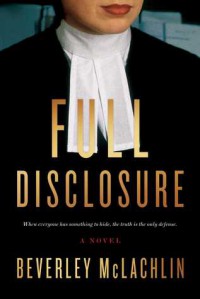Rod Raglin
This blog will touch on the experiences I have as a writer (not to be mistaken for my experience as a writer, i.e. how many books I've written, etc); the pleasure and the pain, the joy and the grief, the satisfaction and the frustration, the magic and the reality - have I left anything out, oh yeah, the rejection, rejection and more rejection, the humiliation and the embarrassment, the jealousy and the resentment - that pretty much covers it, except for why I do it which perhaps I'll realize along the way. Are you totally confused? Good, let's begin.
Harsh judgment for Full Disclosure

Jilly Truitt is a young, ambitious criminal lawyer making a name for herself.
When a wealthy businessman, Vincent Trussardi is accused of murdering his young wife, he reaches out to Truitt to defend him. This will be a high profile case with a significant retainer and Jilly is eager to take it on even though the evidence overwhelmingly suggests her client is guilty.
Full Disclosure is Beverley McLachlin’s first novel after retiring as the longest Chief Justice of the Supreme Court of Canada for seventeen years, the first women to hold that position and the longest-serving Chief Justice in Canadian history.
As a jurist, McLachlin is formidable, as an author she’s just a beginner, and it shows.
There are a number of plot points in the book that stretched this reader’s suspension of disbelief nearly to the breaking point, but I hung in there expecting some insights regarding the Canadian legal system, the professionals involved and those they prosecute or defend.
There weren’t any. In fact, the lack of originality had me wondering if I hadn’t read this before. That isn’t to say I didn’t enjoy it. The story takes place in Vancouver, Canada, my hometown and hers, and it was fun recognizing the restaurants, landmarks and neighbourhoods where the scenes unfold.
Unfortunately, as the novel draws to an end, and with many questions still unanswered, the author (out of desperation?) resorts to the old, tired technique of having her protagonist goad a suspect, Perry Mason style, into confessing. Of course, this confession is taped on a recorder hidden in her pocket and is used to exonerate her client. See what I mean about lack of originality.
Though it didn't have any real bearing on the novel, I was surprised and disappointed at the author’s treatment of a First Nation person in her story. Though a very minor character, when this young woman is challenged by isolation and unhappiness her choice is to become a drug addict and support her habit by prostitution.
With so many other positive possibilities out there, why did someone of the McLachlin’s stature and presumed sensibilities choose this clichéd depiction of our Indigenous people?
Despite the efforts of the best editors Simon and Schuster employ, I doubt Full Disclosure would have been published had it not been for the author’s significant profile which, like all books written by celebrities, assures at least some sales.
The real test will be McLachlin’s next novel.
 1
1



